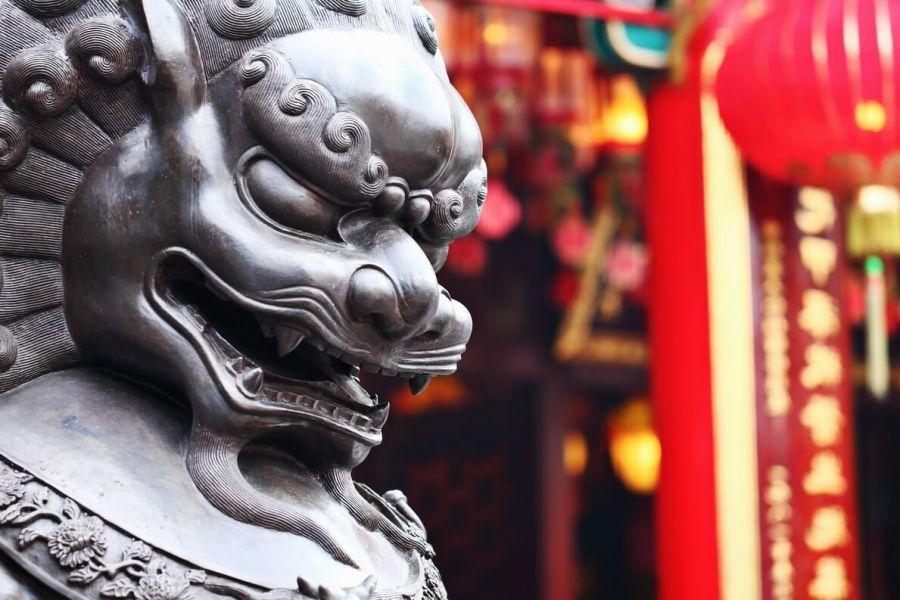Crypto Market Dives as China Continues Crackdown, Singles out Tether & Foreign Platforms

The Chinese central bank, along with a group of ministries, financial regulators, and national-level courts, has issued a joint statement confirming a hard-line stance on crypto. And perhaps worryingly for stablecoin issuers will be the fact that the parties have mentioned tether (USDT) by name – and warned that overseas exchanges that target Chinese customers could face punishment.
The crypto market dived following the news. Bitcoin (BTC) dropped by 5% in an hour and continued correcting lower, ethereum (ETH) lost more than 7% of its value, and major altcoins dropped by 6%-9% right after the story broke. At 13:24 UTC, BTC trades at USD 41,116 and is down by almost 6% in a day and 14% in a week. ETH dropped by 9% in the past 24 hours and almost 22% in a week.
In a notice posted to the website of the central People’s Bank of China (PBoC), the group of government organs spoke of the need to “eliminate” crypto-related “hype” and “speculation.” It claimed that it would enact a number of measures, few of which appear to be particularly novel in light of Beijing’s summer crackdown on crypto mining and crypto-related transactions.
“It seems like China is tightening the noose even further on Bitcoin and on their citizens,” Mati Greenspan, Founder of Quantum Economics, told Cryptonews.com. “They are very afraid of bitcoin’s ability to facilitate capital flight and will do everything within their awesome power to control the money within their borders.”
The announcement appears to have sparked no shortage of confusion among international observers, however, particularly as a social media post with the same announcement from the PBoC (from today) appears to have backdated the announcement to September 15.
In the announcement, the parties spoke of the need to wipe out “criminal activities such as gambling, illegal fund-raising, fraudulent activity, pyramid schemes, and money laundering.”
In one section, the PBoC-led group wrote that “cryptocurrencies such as BTC, ETH and tether exhibit the main characteristics of [tokens] that have been issued by entities that are not [central banks].”
These tokens, they noted “are not legal and should not and cannot be used as currency.”
USDT is a major gateway for many Chinese traders who wish to access the BTC market.
And in another section, the parties wrote of overseas crypto trading platforms:
“Overseas cryptocurrency exchanges that provide services to Chinese residents are also engaging illegal financial activities.”
They warned that China-based “staff of offending overseas exchanges, as well as legal entities that [knowingly] provide overseas [trading platforms] with services such as marketing, promotion, payments, settlements, technical support and more” would “be investigated in accordance with the law.”
Furthermore, the National Business Daily reported, the PBoC has reminded that Chinese financial institutions must “not provide services such as account opening, fund transfers, clearing and settlements” for any “cryptocurrency-related business activities,” and must not “include cryptocurrency” in collateral calculations.
The central bank also reminded commercial banks of their duty to report crypto-related activities to the necessary financial regulators “in a timely manner.”
The group’s members comprised the following organizations and bodies, in addition to the PBoC:
Courts:
- Supreme People’s Court
- Supreme People’s Procuratorate
Ministries:
- Ministry of Industry and Information Technology
- Ministry of Public Security
Regulators:
- Central Cyberspace Administration
- General Administration of Market Supervision
- China Banking and Insurance Regulatory Commission
- Securities Regulatory Commission
- State Administration of Foreign Exchange
Meanwhile, Wen Xinxiang, the Director of the Payment and Settlement Department at the PBoC, has been speaking of the perils of crypto. Per Shangai Securities News, Wen told attendees at the China Payment and Settlement Forum today that he was worried about the way crypto was now being used to transfer illegal funds across national borders.
He claimed that crypto was now divided into two categories, whereby tokens like BTC were providing a source of liquidity, while USDT and other coins were being used for payments.
Wen explained that this would cause a number of possible hazards, by diverting payments away from (and thus damaging) the “business of banks” and “payments providers” and “weakening clearing organizations.”
He also claimed that they enabled “illegal activities” with crypto “making it easier” to conduct criminal transactions and commit money laundering-related offenses.
In either case, the China news is getting widespread attention at the moment.
In an apparent response to the news, prices of tokens associated with exchanges with ties to China, such as Huobi and OKEx, were hit the hardest, with huobi token (HT) down nearly 14% in the past hour and OKB down 11% for the hour.
Noteworthy is also that the news broke just as a major bitcoin options expiry has taken place, which was previously reported as one of the largest options expiry days of 2021.
What happens to #BTC price tomorrow after expiry?
— Deribit (@DeribitExchange) September 23, 2021
Popular crypto trader Scott Melker, aka The Wolf of All Streets, told Cryptonews.com that China “has repeatedly “banned” Bitcoin and cryptocurrencies, so this news is more of the same.”
Melker expects “the market to react with the usual short term panic as the news is absorbed, and then for traders and investors to realize that little has changed and for the market to become rational once again.”
“The Fear & Greed Index tells us we’re in a state of fear, which might see temporary sell off, but this is all due to China FUD (Fear Uncertainty and Doubt). The current adoption rate at the moment is significant and this is only positive for crypto,” Freddie Williams, Sales Trader at the UK-based digital asset broker GlobalBlock, wrote in an emailed comment.
“We’ve also seen this before from China where news of bans have been reported over the years, but it has not prevented the adoption of Bitcoin and digital assets from continuing their upward trend,” Williams added.
“Investors should be careful not to make emotional decisions based on this trending news story as on-chain fundamentals still indicate that bull market continuation in Q4 is likely,” Ulrik K.Lykke Executive Director at crypto/digital assets hedge fund ARK36, said in an emailed comment.
He added that China has been going through a rough economic patch recently due to the uncertainty surrounding the Evergrande debt restructuring.
“It is not unlikely that the Chinese government realized that the uncertainty caused a capital flight via digital assets and reinforced its ban imposed in May to curb this,” Lykke said, adding that the willingness to use BTC is “a very telling sign of just how much long-term confidence investors already have in this asset.”
George Zarya, CEO at digital asset prime brokerage and exchange BEQUANT, also noted that China has been known to go to extremes with either very assertive statements and prosecutions to complete radio silence.
“This time the point was made very clear that China will not support cryptocurrency market development as it goes against its policies of tightening up control over capital flow and big tech,” Zarya said in an emailed comment.
According to him, for the institutional crypto industry, it won’t change much as those who could leave already left and those who couldn’t have either closed or gone under the radar.
“The retail market most likely has gone under the radar and will continue to support market volumes,” Zarya noted.
Meanwhile, Jeremy Allaire, the CEO of US-based crypto company Circle, the issuer of the second-most popular stablecoin USD Coin (USDC), took to Twitter to send a “message” to US and Western policymakers.
Allaire focused on the difference between regimes, placing China on the side that “opposes the Western system of values built on openness, transparency, privacy, free market competition,” among others.
As the Internet represents all of these, the government wants to control it. With the crypto industry, these values are “deeply at the core of crypto and blockchains, enshrining them into new economic and governance infrastructure,” and are hence a threat to the systems built on control and centralization.
Therefore, “there are two modes of reacting to China in US,” he said:
“FOMO, envy and a belief that we should be more like them, given their ability to execute; vs a stoic / determined outlook that believes in the open internet. Be on the right side of history; embrace the open internet of value,” Allaire argued.
Pat Toomey, the top Republican on the Senate Banking Committee, seems to agree:
China’s authoritarian crackdown on crypto, including #Bitcoin, is a big opportunity for the U.S. It’s also a reminder of our huge structural advantage over China.
— Pat Toomey (US Sen. ret.) (@SenToomey) September 24, 2021
_____
Reactions:
What's left for them to ban? NFTs?
— Luke Martin (@VentureCoinist) September 24, 2021
Can't wait for the Bloomberg headline telling us China is banning Pudgy Penguins and Cat Dicks.
Ask yourself this: is it really September in crypto without some China FUD?
— Ξlias Simos (@eliasimos) September 24, 2021
For example, it emphasized that people and companies in China that provide technology, marketing, and payment services to exchanges outside of China should also be held accountable.
— Wu Blockchain (@WuBlockchain) September 24, 2021
https://www.twitter.com/sss4321_s/status/1441331136119017480*If* BTC can fade this news and print a higher low above $42k, I think we see daily structure reverse and print a higher-high above $48.8k. $42k has been a range high since January, it would be the ideal place to bear trap below (the move into $39.6k) and then push higher again.
— Nik Patel (@cointradernik) September 24, 2021
Whenever they get bored at China Central Bank they say "Let's ban Bitcoin again" https://t.co/yPVI0uVcKn
— CoinMamba (@coinmamba) September 24, 2021
— Dap 🧙🏽♂️ (@dapdoctor) September 24, 2021
____
Learn more:
– Bitcoin & Crypto Drop Alongside Stocks On China’s Evergrande Spillover Risks
– China Goes After Camouflaged Crypto Miners Ahead of Winter Season
– Chinese Banks Bolster Digital Yuan Resources Prior to CBDC Debut
– Chinese Court Says Crypto is ‘Not Protected By Law’
– China Releases e-CNY Whitepaper, Says Cryptos Have No Value & Pose Risks
– China Doubles Down On Crypto FUD By Recycling Old Warnings
___
(Updated at 10:19 UTC with a comment from Scott Melker. Updated at 10:53 UTC with additional comments from the PBoC. Updated at 11:40 UTC with additional comments from Mati Greenspan and Freddie Williams. Updated at 13:26 UTC: updates throughout the entire text. Updated at 16:03 UTC with a tweet by Pat Toomey.)




